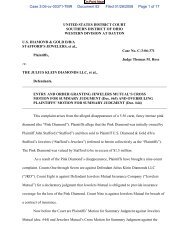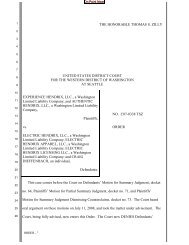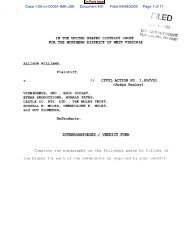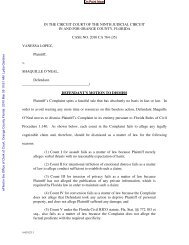GORDON KEENE VELLA. - On Point News
GORDON KEENE VELLA. - On Point News
GORDON KEENE VELLA. - On Point News
Create successful ePaper yourself
Turn your PDF publications into a flip-book with our unique Google optimized e-Paper software.
The Court and the jury relied upon the testimony of Dr. Brown for more than simply<br />
whether or not there was a scientific theory supporting the accuracy of Plaintiff’s allegations.<br />
The threshold question, as repeatedly noted by the Court during the trial, was whether Plaintiff<br />
had, in fact, completely forgotten the alleged memories and recovered them less than one year<br />
prior to the filing of the suit. Thus, the Court and the jury undeniably relied upon Dr. Brown’s<br />
testimony concerning the Plaintiff’s position that she did not and could not remember the alleged<br />
abuse prior to “recovering” the repressed memories.<br />
Dr. Christopher Barden has offered additional information regarding the paucity of any<br />
“peer review published, credible error rate” for Dr. Brown’s repressed memory hypothesis and<br />
the absence thereof as a major reason for the exclusion of expert opinion testimony seeking to<br />
apply this hypothesis. According to Dr. Barden,<br />
[O]ne of the essential issues with regard to the admissibility of testimony<br />
regarding “repressed memories,” “dissociative amnesia”, and related ideas<br />
has been the lack of a peer reviewed published, credible error rate.<br />
(Barden Decl. 33.) Indeed, the lack of a peer reviewed, credible error rate for “dissociative<br />
amnesia” has plagued Dr. Brown’s ability to testify before other courts, and he has been “among<br />
the expert witness proponents whose testimony was rejected in the fully litigated Hungerford,<br />
Quattrochi, and Bourgelais cases.” (Id.)<br />
In light of these previous exclusions, it is reasonable to assume that Dr. Brown was aware<br />
that, in the absence of credible error rates to support the hypothesis, courts would continue to<br />
question the validity of “dissociative amnesia” and that the possibility of exclusion was<br />
significantly greater in the absence of an articulated error rate for the hypothesis in general.<br />
It is also important to note that Dr. Brown mentioned no supporting evidence when<br />
espousing an error rate related to this hypothesis, and probably for good reason. As explained by<br />
- 12 -
















